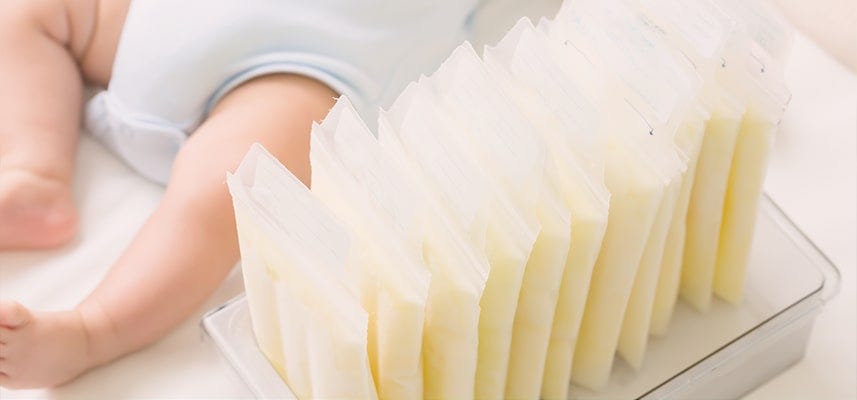After you’ve had a little one, thinking about your nutrition can feel like one more thing to do. Some find that keeping nutrition in mind and prioritizing delicious and nutritious meals can help the healing process postpartum. While your breast milk will nourish your baby regardless of your diet, there’s no harm in considering how the fuel you put in your tank helps nourish your body.
For all of its helpful features, the internet can be full of misinformation and contradicting recommendations regarding diet and breastfeeding. Before you make any changes to your diet, consult with a trusted healthcare provider.
At the end of the day, it’s all about balance. Motherhood is challenging, and while healthy eating is important, you may crave a sweet treat or comfort food at times. Don’t beat yourself up or stress about perfect eating habits while you are breastfeeding. Trust your body and remember that it knows how to keep your baby fed.
A lactation specialist is an excellent resource to consult when it comes to pregnancy and breastfeeding support. They can help you navigate the first year of feeding, share information about how to pump your milk and recommend a breastfeeding class.
Many insurance plans cover pregnancy and breastfeeding classes and one-on-one consultations. To check your eligibility, fill out our form.
In the meantime, if you’re doing research about how your diet affects breastfeeding outcomes, our recommendation is: Don’t stress! As long as you are eating enough to feel full, you are probably in good shape. However, if you find that your baby is gassy, getting thrush, or you have other concerns, reach out to your healthcare provider. They can help you adjust your diet to balance your microbiome and consider what you may want to add or eliminate to address any symptoms you may be noticing.
Want more info on how you can support and nourish your own body while breastfeeding and how your diet may affect your milk? Keep reading.
Diet and Breastfeeding: The Basics
Beginning to Breastfeed: Colostrum and “First Milk”
The first milk your body makes is called colostrum. This is an amazing resource for your baby (and is why early breastfeeding is so important). This pale yellow "first milk" is high in antibodies and helps your child build immunity to viruses. After colostrum, your body begins to make mature milk, which comes two to four days after giving birth. This milk provides the vitamins and minerals that are essential for your baby.
What to Eat While Breastfeeding
When thinking about what to eat to nourish the body and improve health outcomes, the main recommendation, whether you are breastfeeding or not, is a balanced diet that includes fibrous carbohydrates like fruits, vegetables, and whole grains; proteins like fish, chicken, beef, beans, soy products, and protein-rich grains; and healthy complex fats like those found in avocados, olive oil, nuts, and dairy products. You don't need to eat for two, but exclusive breastfeeding requires an additional 300–500 calories per day, so you should ensure you’re getting enough to eat. If you find yourself hungry, add a few healthy snacks to keep your body satisfied.
Many moms want to know if certain foods can increase milk supply. This is a great question, but a lot more research is needed to know for sure—so much is unknown. Brewer’s yeast, oatmeal, and dates have all been touted to increase milk production, but there isn’t any science to back these claims, and most women do not experience any change in milk production after eating these foods.
The best thing you can do for yourself and for your baby while breastfeeding is to fuel your body well.
Because we all have different taste buds, dietary preferences, and dietary restrictions, we can’t tell you what you should eat day-to-day. What we can tell you is whole foods in their natural state are often the most nutrient-rich, and the foods that are recommended for pregnant or nursing mamas are really the same foods that are recommended for any healthy adult.
If you have concerns about your diet, speak with your healthcare provider for specific guidance.
Food Ideas for Breastfeeding Parents
Prepping meals and cooking while postpartum can be hard, and worrying about nutrition can be overwhelming. While no breastfeeding superfood exists, knowing which foods pack a nutritional punch, and finding ways to easily snack on them or incorporate them into your favorite dishes can make mealtime a little bit easier.
When planning your meals, keep in mind that there are three main food types that we need to thrive: Proteins, Carbohydrates, and Fats.
If you can find foods that fit into those categories and also offer beneficial vitamins and minerals, you’re doing great. Let’s break down these categories, the foods that fall within them, and ideas for incorporating them into your daily diet.
Protein
Animal proteins like chicken, beef, pork, eggs, and dairy products are good options, and so are vegetable-based proteins like beans, lentils, seeds, soy products, and protein-rich grains like quinoa.
Looking for a protein-packed snack? Consider hard-boiled eggs. Not only are eggs a quick and easy snack for sleep-deprived parents, but they are also packed full of nutrients, including choline, vitamins A, B12, D, K, selenium, iodine, and protein.
Not feeling eggs? Other easy snack options include hummus (a spread made from chickpeas), greek yogurt with some chia seeds sprinkled on top, or some edamame (soybeans).
Carbohydrates
Grains
Wheat products like bread, pasta, and baked goods; oat products like oatmeal or porridge; and other grains like rice, quinoa, and farro are all great options for filling and nutritious grains.
Oatmeal has long been touted as a breastfeeding superfood, and while there is no scientific evidence that it increases milk supply, eating oatmeal, oatmeal muffins, and other oat products is a filling way to add some fiber and iron to your diet.
Planning a stirfry or pilaf? Brown rice is a complex carbohydrate that will not only keep you fuller for longer but will also help regulate your blood sugar levels. It’s also an excellent source of zinc, magnesium, protein, and fiber.
Looking for a rice alternative? Try quinoa. This protein-rich and fibrous grain is a good source of magnesium, which helps your body absorb calcium. With its mild and nutty flavor, quinoa is easy to incorporate into soups, stews, and alongside rice.
Vegetables
Bright and colorful vegetables like bell peppers; greens like lettuce, kale, and spinach; and root vegetables like carrots, parsnips, and sweet potatoes are all vitamin-rich options that can be easily added to salads, soups, and a variety of dishes.
Not a veggie fan? Consider adding them to smoothies, so the sweetness and tartness of the fruit can help balance the earthiness of the veggies.
Fruits
Melon like cantaloupe, honeydew, and watermelon; tropical options like mango, pineapple, and bananas; citrus fruits like oranges, grapefruits, lemons, and limes; berries like strawberries, raspberries, and blueberries; and supermarket stables like apples, grapes, and nectarines are all wonderful toppings for yogurt, oatmeal, salad or snacks in their own right!
Craving ice? Freezing grapes, blueberries, chopped-up pieces of mango, and other fruits can make for a nice cold popsicle-like snack for mamas with pica (a condition that is thought to be caused by a micronutrient deficiency that can cause cravings for ice or other non-food items) or those who just enjoy a cold sweet treat.
Fats
Proteins rich in fats like salmon, nuts, and soy products; fruits and vegetables high in fats, like avocados and olives; full-fat dairy products like yogurt and cheese; as well as oils and spreads like ghee, olive oil, nut oils, and nut butters are all good sources of fat.
Avocado toast, peanut butter toast, and toast with butter (or ghee) are all delicious breakfast options for adding a little fat to your diet. Even better, you can stack your toast or bagel with nuts, seeds, fruits, or veggies to add some additional vitamins and minerals.
More of a bagel fan? Having a bagel and lox (smoked salmon) sandwich is a great way to add fat to your breakfast, and it’s brimming with protein and DHA (part of the omega-3 fatty acid).
How Much Water to Drink While Breastfeeding
Mothers should drink based on their thirst when breastfeeding. While many sources offer eight glasses of water a day and other similar quantities as the ideal, how much water you should drink is really based on your height and weight. Speak with your doctor for specifics, but in general, as long as you are drinking enough water to quench your thirst, you are probably fine. Contrary to popular belief, drinking excessive amounts of water or other fluids will not lead to an increase in milk production.
Foods to Avoid While Breastfeeding
There is an abundance of information out there about foods to avoid while breastfeeding. Here’s what scientific experts say about what to avoid (and a few food myths that you shouldn’t worry about).
Alcohol
Alcohol brings no benefit to breastfeeding and is not encouraged. Beyond the fact that it passes through the breastmilk—-requiring the drinker to “pump and dump” their milk or to wait 2-3 hours before breastfeeding or pumping—consuming alcohol can also decrease your milk supply.
That said, if you do want to have a drink periodically, alcohol can be consumed in moderation while breastfeeding. The Academy of Breastfeeding Medicine (ABM) defines moderate alcohol intake as up to one standard drink per day—12 ounces of beer (5% ABV), 5 ounces of wine (12% ABV), or 1.5 ounces of hard liquor (40% ABV).
As noted above, it’s best to wait at least 2-3 hours after each alcoholic beverage to breastfeed or pump so that most of the alcohol consumed has been metabolized (cleared) and will not pass from mom to baby. You can learn more about alcohol and breastfeeding here.
Fish
Lactating mothers should moderate the amount of high-mercury fish they eat. While fish is generally a great source of protein and healthy fats, fish like tuna (including albacore, tuna steak, and certain amounts of canned light tuna), mackerel, shark, kingfish, and swordfish should be consumed in moderation or avoided. If you would like to find out which fish are lower in mercury, check out this information from the Environmental Protection Agency (U.S Environmental Protection Agency, 2022). Good fish options that are high in DHA include salmon, bluefish, trout, flounder, canned light tuna (in moderation), and bass.
Caffeine
Caffeine provides no benefit to breastfeeding parents and can affect iron absorption. Still, many sleep-deprived parents enjoy a cup in the mornings. Caffeine can be consumed in moderation—up to 2-3 cups of coffee or around 200 mg per day. But keep in mind that large amounts of caffeine may decrease breast milk supply and can also pass to one’s baby through milk, causing symptoms such as jitteriness and irritability.
Herbs
Peppermint, parsley, and sage should be avoided in large amounts while breastfeeding as they are associated with a decline in milk supply. Most herbal teas are safe while breastfeeding in most cases, although it is always best to check the tea ingredients to ensure the herbs are safe.
Artificial Sweeteners
Some mothers may be concerned about consuming artificial sweeteners while breastfeeding. There are a handful of studies looking at whether or not artificial sweeteners, like aspartame, pass into breast milk. Based on the results of these studies, the levels of artificial sweeteners in breast milk are extremely low and well below toxic threshold levels. Still, with little data on the topic, many mothers choose to avoid artificial sweeteners while breastfeeding and pumping.
Can I take Vitamins and Supplements While Breastfeeding?
You should always talk to your doctor before taking any kind of supplement. Regular multivitamins and mineral supplements are typically fine to take. In fact, many doctors recommend that moms keep taking their prenatal vitamins even after childbirth to ensure that both mom and baby are getting all of the nutrients they need. As long as you're eating a healthy, balanced diet, however, your baby should get everything he or she needs from your breast milk.
Best Supplements for Breastfeeding Moms
While most vitamins and minerals are readily available in the food we eat, healthcare providers may recommend supplements in addition to a balanced diet if they identify a deficiency. Some may recommend supplements even if no deficiency is apparent to ensure that you are getting all of the nutrients your body needs during this time of healing and recovery.
Iron
Iron supplementation is not required for non-anemic breastfeeding moms, but many breastfeeding moms take iron supplements because research shows it can positively impact exclusively breastfed babies. Iron is best absorbed when taken with vitamin C, so try drinking a glass of orange juice with your supplement to make the most of it!
Vitamin D
Vitamin D is an essential nutrient for healthy bones for both moms and babies. It’s recommended for breastfeeding mothers to take a vitamin D supplement to ensure adequate vitamin D is passed through the breast milk to the infant. Taking a vitamin D supplement of 160 mg/day (6,400 IU/day) will ensure that your infant gets enough vitamin D in the first seven months. The American Academy of Pediatrics (AAP) also recommends that all breastfed babies receive a daily Vitamin D supplement (400 IU/day) until their first birthday.
It is imperative that you do not begin your baby on a supplement regimen without first consulting your child's pediatrician.
Choline
Choline is a nutrient that is increasingly recognized as important for developing babies’ brains and nervous systems. Eggs are the best dietary source of choline, but it is also found in fish, many types of meat, soybeans, wheat germ, and cruciferous vegetables (such as broccoli and cauliflower). If moms continue to take their prenatal vitamins while breastfeeding, it’s a good idea to choose formulations that include choline as an ingredient.
Fats/DHA
Omega-3 fatty acids, such as docosahexaenoic acid (DHA), are essential for brain and eye development. Research has shown that the majority of mothers in the U.S. are deficient in omega-3 fatty acids while pregnant and nursing. The two ways that mothers can be sure to get enough omega-3 fatty acids in their diet are to eat fish on a regular basis or to take a DHA supplement. Mothers can get enough DHA in their diet by eating 2-3 servings of fish per week. The best fish sources of DHA are salmon, trout, herring, and sardines.
DHA supplements of at least 300 mg per day have been recommended for several years, and many experts are now recommending that breastfeeding women take up to 1g of DHA per day.
What about prenatal/postnatal vitamins?
Some women choose to continue taking prenatal vitamins after childbirth. Pediatricians usually recommend that mothers continue taking a daily prenatal vitamin supplement to ensure the proper nutritional balance for both mom and baby. Since prenatal vitamins have folate, which prevents anemia, it's a good idea to continue taking them after you give birth for added health benefits to you and your baby. A multivitamin can also be taken alongside a folate supplement for added benefits.
Special Diets While Breastfeeding
Allergies, preferences, intolerances—there are several reasons to omit, add, and refine the foods you eat. You may be committed to a special diet or working to eat healthier all around.
Before you make any changes to your diet, consult with a trusted healthcare provider to ensure you are getting the right amount of nutrients (Academy of Nutrition and Dietetics, 2023). Most insurance providers cover pregnancy and breastfeeding classes and even one-on-one consultations with IBCLCs. Check your eligibility to see how you can get support.
Vegan, Vegetarian, and Flexitarian Diets While Breastfeeding
The flexitarian diet consists of mostly plant-based foods but allows meat and other animal products in moderation. It is not as restrictive as a vegetarian (consume no animal products and may consume milk, eggs, and cheese) or vegan diet (no animal products including milk, eggs, and cheese). Any of these options for breastfeeding mothers are great choices as long as you are getting enough nutrients.
A number of studies have shown the breast milk of a woman who is following a vegetarian or vegan diet is similar to those who do not. However, their diets may be lower in fatty acids (e.g., omega-3 fatty acids/heart-healthy fats), vitamin B12 (found primarily in animal products), or iodine (found in fish, dairy, and iodized table salt). These nutrients are also very important for a baby's brain development (Pawlak, 2023; Karcz, 2021). Also, some mothers following a vegetarian diet may need a higher level of calories during breastfeeding (Sebastiani, 2019).
As long as you are maintaining a diet that fills your daily need for vitamin B-12, calcium, and zinc, then your baby will reap all the benefits of a healthy diet. Breastfeeding while maintaining a vegan diet is in no way harmful to your baby. It has been noted that vegans have very healthy pregnancies and children.
Celiac Disease and Breastfeeding
Breastfeeding mothers with celiac disease, an autoimmune disease that is triggered by exposure to a food protein called gluten, need to adhere to a gluten-free (GF) diet at all times while breastfeeding. Being on a gluten-free diet increases the risk of several micronutrient deficiencies, including folate, calcium, iron, and zinc. Thus, it’s important for GF mothers to make sure that they increase their intake of foods that are rich in these minerals during milk production.
Mediterranean Diet or DASH Diet While Breastfeeding
Many people have long-term success with the Mediterranean diet and DASH (Dietary Approaches to Stop Hypertension) diet. However, some individuals may find it hard to meet all of the expectations of each of these diets, and they may not include favorite family or cultural foods (MedlinePlus, 2018; MedlinePlus, 2022). These diets often focus on creating meals around vegetables, whole grains, fruits, olive oil, beans, and seeds, but they also encourage wine and fish consumption.
As you are breastfeeding, it is okay to follow either of these diets as long as you are limiting your alcohol use and eating fish lower in mercury.
Weight Watchers and Tracking Food While Breastfeeding
The Weight Watchers plan is all about tracking your food. They have a plan for breastfeeding moms to follow that provides advice on how to get the necessary calories and nutrients. This diet can be modified and adapted to meet your needs while helping you work towards your goals.
It is important to note that for some people, counting calories and tracking food may lead to weight loss right away, but it may not be attainable, especially if the foods are different from what your family or support system is eating. Counting calories or tracking food may not support you in living a healthy and balanced diet as it may lead to not eating enough of the nutrients you need and/or increase stress, anger, and guilt about eating, which may not assist you in meeting your health or pregnancy and breastfeeding goals (Kaufman, 2022).
Weight Watchers and Tracking Food While Breastfeeding
The Weight Watchers plan is all about tracking your food. They have a plan for breastfeeding moms to follow that provides advice on how to get the necessary calories and nutrients. This diet can be modified and adapted to meet your needs while helping you work towards your goals.
It is important to note that for some people, counting calories and tracking food may lead to weight loss right away, but it may not be attainable, especially if the foods are different from what your family or support system is eating. Counting calories or tracking food may not support you in living a healthy and balanced diet as it may lead to not eating enough of the nutrients you need and/or increase stress, anger, and guilt about eating, which may not assist you in meeting your health or pregnancy and breastfeeding goals (Kaufman, 2022).
Whole 30, Paleo, and Keto Diets While Breastfeeding
On the Whole 30 diet, you eliminate sugar, alcohol, grains, legumes, soy, and dairy from your diet for 30 days. If you are interested in trying this diet, there is a list of modifications recommended for breastfeeding women. The Paleo diet is similar in its restrictions but allows natural sweeteners like honey and maple syrup. These diets may be difficult for breastfeeding moms to follow because of the restrictions. The main issue breastfeeding moms may run into while on either diet is a decreased milk supply resulting from the elimination or reduction of calories or carbohydrates (Lee, 2016).
A strict, low-carbohydrate diet, as is suggested on the ketogenic (keto) diet, may cause concerning side effects because it restricts healthy foods like whole grains and fruits. These carbohydrates are important for healthy brain function. Additionally, ketosis occurs when your body uses fat for energy instead of glucose and can cause dehydration, which is a major concern for breastfeeding mothers.
Intermittent Fasting While Breastfeeding
Intermittent fasting can follow several different schedules. Some people choose a 5:2 alternate-day fasting plan (consuming 25% or less of their normal calories on the two days they are fasting). This may cause your milk supply to decrease and is often not recommended during breastfeeding.
Another way to do intermittent fasting is known as the 16:8, meaning you fast for 16 hours and only eat during an eight-hour time period each day. As long as a healthy, nutrient-dense (high in fiber and protein, with sources of vitamins and minerals) diet is maintained during this eating schedule and milk supply is established, the concern is lessened. It is important to monitor your health and your baby’s growth (Lee, 2016).
Breastfeeding a Baby With Allergies, Intolerances, or Colic
Can breastfed babies really get food allergies and/or react to food proteins in their mothers’ breast milk?
Yes, they can. Symptoms of food allergies and intolerances in babies include rashes and/or digestive symptoms, such as reflux, refusing to feed, and blood and/or mucus in stools. If you are breastfeeding a baby who has been diagnosed with a food allergy, it’s essential to eliminate all possible sources of the food that your baby has reactions to in your diet.
Can avoiding certain foods while breastfeeding prevent my baby from developing food allergies?
It’s recommended that breastfeeding mothers eat a full, balanced diet and only restrict certain foods if medically necessary. Breastfeeding and delaying solids can help minimize baby allergies. Once solids are introduced, your baby's direct exposure to common allergens (by eating it themselves) is believed to minimize their odds of developing an allergy.
Recognizing Dairy Intolerance Symptoms in Baby
Sensitivity to dairy, or any food for that matter, is not a joyous occasion. For infants and babies, symptoms range from diarrhea, eczema, vomiting, and colic to constipation and poor growth. This makes every day painful and uncomfortable for both baby and mom.
Dairy Elimination Diet
The Dairy Elimination Diet is one contender that has proven to work great for babies with dairy allergies. This diet calls for moms to cease all dairy intake during the duration of breast pumping or feeding. Once dairy is eliminated, you should see improvements in your baby’s symptoms within a couple of days, and full elimination of symptoms in a few weeks.
Depending on the severity of the symptoms, some healthcare professionals may recommend that mamas begin adding dairy back into their diets after their baby is six months old to see if the allergy symptoms return. You should always check with your healthcare provider before making an adjustment to your diet.
Keep Your Diet in Check
Even without dairy, you are still able to achieve a well-balanced diet! Sources of protein can come from fish, chicken, beef, eggs, and nuts. Also, calcium can be found in soy, rice, almond, and coconut milk.
Can babies tolerate spicy and gas-producing foods in breast milk?
Yes, most babies tolerate spicy foods just fine. If you believe your baby has colicky symptoms due to a certain food, such as excessive gas or crying, it’s best to speak with your healthcare provider.
Can breastfeeding mothers “cure” their babies' colic by changing their diet?
There is a very complex protocol that can support mothers and their babies in reducing the symptoms of colic, called FODMAP. FODMAP is an elimination diet that should only be administered under the guidance of a dietitian. There is no scientific or medical evidence that major dietary restrictions of all dairy products, soy, wheat, eggs, and corn from mothers’ diets make any difference in symptoms of colic.
Frequently Asked Questions About Diet, Breastfeeding, and Pumping
Is breastfeeding a good way to lose all of my pregnancy weight?
For a long time, breastfeeding was marketed as a great tool for new mothers to shed weight and get back to their pre-pregnancy weight. In reality, it takes up to a year for most new mothers to lose all of their pregnancy weight, regardless of whether or not they are breastfeeding. Some nursing mothers find themselves unable to drop their last few extra pregnancy pounds until their little ones are totally weaned.
How can I find the time to prepare and eat healthy foods while breastfeeding?
It can be really hard to find time to make healthy, nutritious meals when you have a newborn, so it’s okay to reach out for help and ask family members, neighbors, and friends to make and drop off healthy meals and snacks for you. Other tips for healthy eating while breastfeeding include:
- Prepping and cooking for several days’ worth of meals all at once. This can include chopping all vegetables for a week’s worth of recipes on a Sunday afternoon. It can also include “batch” cooking and duplicating the meals you prepare. One example is roasting two chickens at once. You can eat one roasted chicken for dinner and shred and save the second one for a second (or third) meal later in the week, like chicken fried rice or chicken soup.
- Using food and grocery delivery services, such as Instacart and Peapod.
- Using meal delivery services that provide ready-made meals or low-effort meals.
- Starting a meal train for yourself tailored to your specific dietary needs. For example, if you have celiac disease and are gluten-free, not only request gluten-free meals but also make sure to give examples and suggestions of basic meals for others to prepare, i.e. plain roasted meats and vegetables, rice, potato-based dishes, etc.
- Buy healthy snacks, like bags of almonds or containers of yogurt, in bulk. Always have chopped fresh vegetables and fruits ready to eat in your fridge.
- Aim for several quick but nutritious meals every week, like omelets with spinach (or other leafy greens), chicken stir fry, or oatmeal with fresh berries and almond milk.
Will the foods I eat affect the taste of my breast milk?
Breast milk not only changes color but also can taste and smell differently based on mothers’ diets. Eating a lot of beets can make milk look pinkish-purple, and the carotenoids (vitamin A components) in carrots and sweet potatoes can make milk turn orange. Eating certain foods can also make breast milk taste different, too.
The flavors of foods that mothers eat enter into their breast milk about 2-3 hours after consumption and can be detected for up to 8 hours.
Research has shown that infants prefer sweet and savory flavors during their first few months of life and that a preference for salt starts to emerge around four months. This is thought to be evolutionary, as it assures that newborns will prefer the taste of breast milk, which is on the sweet side due to being high in lactose.
There is anecdotal evidence that babies who are exposed to a wide variety of flavors in breast milk may be more “adventurous” eaters later on. So, if you like to eat spicy, flavorful foods, make sure to continue to do so while producing breast milk!
Getting Support While Breastfeeding
As you begin (or continue) your breastfeeding journey, work with a trusted healthcare provider to determine what your body needs and what is best for your baby. Don’t overthink it. As long as you are eating and drinking enough to stay satiated, and avoiding things like alcohol or too much caffeine, your baby will be nourished by your milk.
An IBCLC can provide clear directions and practical tips to help you feel more confident in breastfeeding. They can also recommend breastfeeding classes.
Many insurance plans cover pregnancy and breastfeeding classes and one-on-one consultations with certified instructors. To check your eligibility, fill out our form.











